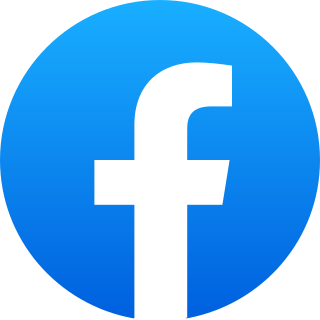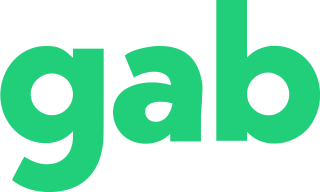
Social media are interactive technologies that facilitate the creation and sharing of information, ideas, interests, and other forms of expression through virtual communities and networks. While challenges to the definition of social media arise due to the variety of stand-alone and built-in social media services currently available, there are some common features:
- Social media are interactive Web 2.0 Internet-based applications.
- User-generated content—such as text posts or comments, digital photos or videos, and data generated through all online interactions—is the lifeblood of social media.
- Users create service-specific profiles for the website or app that are designed and maintained by the social media organization.
- Social media helps the development of online social networks by connecting a user's profile with those of other individuals or groups.

Facebook is an online social media and social networking service owned by American company Meta Platforms. Founded in 2004 by Mark Zuckerberg with fellow Harvard College students and roommates Eduardo Saverin, Andrew McCollum, Dustin Moskovitz, and Chris Hughes, its name comes from the face book directories often given to American university students. Membership was initially limited to Harvard students, gradually expanding to other North American universities and, since 2006, anyone over 13 years old. As of 2020, Facebook claimed 2.8 billion monthly active users, and ranked fourth in global internet usage. It was the most downloaded mobile app of the 2010s.

Twitter is a microblogging and social networking service on which users post and interact with messages known as "tweets", owned by American company Twitter, Inc. Registered users can post, like, and retweet tweets, however, unregistered users have the ability to only read tweets that are publicly available. Users interact with Twitter through browser or mobile frontend software, or programmatically via its APIs. Prior to April 2020, services were accessible via SMS. Tweets were originally restricted to 140 characters, but the limit was doubled to 280 for non-CJK languages in November 2017. Audio and video tweets remain limited to 140 seconds for most accounts.
Social television is the union of television and social media. Millions of people now share their TV experience with other viewers on social media such as Twitter and Facebook using smartphones and tablets. TV networks and rights holders are increasingly sharing video clips on social platforms to monetise engagement and drive tune-in.
Social network advertising, also social media targeting, is a group of terms that are used to describe forms of online advertising/digital marketing that focus on social networking services. One of the major benefits of this type of advertising is that advertisers can take advantage of the users' demographic information and target their ads appropriately.

A hashtag is a metadata tag that is prefaced by the hash sign, #. Hashtags are used on microblogging and photo-sharing services such as Twitter or Instagram as a form of user-generated tagging that enables cross-referencing of content by topic or theme. For example, a search within Instagram for the hashtag #bluesky returns all posts that have been tagged with that term. After the initial hash symbol, a hashtag may include letters, numerals, or underscores.
Social media marketing is the use of social media platforms and websites to promote a product or service. Although the terms e-marketing and digital marketing are still dominant in academia, social media marketing is becoming more popular for both practitioners and researchers. Most social media platforms have built-in data analytics tools, enabling companies to track the progress, success, and engagement of ad campaigns. Companies address a range of stakeholders through social media marketing, including current and potential customers, current and potential employees, journalists, bloggers, and the general public. On a strategic level, social media marketing includes the management of a marketing campaign, governance, setting the scope and the establishment of a firm's desired social media "culture" and "tone."
Klout was a website and mobile app that used social media analytics to rate its users according to online social influence via the "Klout Score", which was a numerical value between 1 and 100. In determining the user score, Klout measured the size of a user's social media network and correlated the content created to measure how other users interact with that content. Klout launched in 2008.
Censorship of Twitter refers to Internet censorship by governments that block access to Twitter. Twitter censorship also includes governmental notice and take down requests to Twitter, which Twitter enforces in accordance with its Terms of Service when a government or authority submits a valid removal request to Twitter indicating that specific content is illegal in their jurisdiction.
Since the arrival of early social networking sites in the early 2000s, online social networking platforms have expanded exponentially, with the biggest names in social media in the mid-2010s being Facebook, Instagram, Twitter and Snapchat. The massive influx of personal information that has become available online and stored in the cloud has put user privacy at the forefront of discussion regarding the database's ability to safely store such personal information. The extent to which users and social media platform administrators can access user profiles has become a new topic of ethical consideration, and the legality, awareness, and boundaries of subsequent privacy violations are critical concerns in advance of the technological age.
Stop Cyberbullying Day is an international awareness day launched by The Cybersmile Foundation on 17 June 2012, taking place on the third Friday of June annually. The day encourages people from around the world to show their commitment toward a truly inclusive and diverse online environment for all, without fear of personal threats, harassment or abuse.
The Federalist is an American conservative online magazine and podcast that covers politics, policy, culture, and religion, and publishes a newsletter. The site was co-founded by Ben Domenech and Sean Davis and launched in September 2013.
Hashtag activism refers to the use of Twitter's hashtags for Internet activism. The Hashtag, has become one of the many ways that social media contributes to civic engagement and social movements. The use of the hashtag on social media provides users with an opportunity to share information and opinions about social issues in a way that others (followers) can interact and engage as part of a larger conversation with the potential to create change. The hashtag itself consists of a word or phrase that is connected to a social or political issue, and fosters a place where discourse can occur. Social Media, provides an important platform for historically marginalized populations. Through the use of hashtags these groups are able to communicate, mobilize, and advocate for issues less visible to the mainstream.
Twitter Amplify is a video advertising product that Twitter launched for media companies and consumer brands in May 2013. The product gives broadcasters the opportunity to publish real-time in-tweet video clips that are accompanied by pre-roll or post-roll advertisements. It is Twitter's major initiative in social television, designed to enhance the user experience with premium and timely TV highlights, enable broadcasters to reach new audiences and provide brands with a cross-platform tool for reaching the social conversation around major events.
Natter was a social network, often referred to as a "microblogging" or even "micro-microblogging" platform. Natter allowed its users or “natterers” to post up to 100 characters and an image in each post, which could then be seen by any online users.

The Internet Research Agency, also known as Glavset and known in Russian Internet slang as the Trolls from Olgino, is a Russian company engaged in online influence operations on behalf of Russian business and political interests. It is linked to Russian oligarch Yevgeny Prigozhin and based in Saint Petersburg, Russia.

Gab is an American alt-tech microblogging and social networking service known for its far-right userbase. Widely described as a haven for neo-Nazis, racists, white supremacists, white nationalists, antisemites, the alt-right, supporters of Donald Trump, conservatives, right-libertarians, and believers in conspiracy theories such as QAnon, Gab has attracted users and groups who have been banned from other social media platforms and users seeking alternatives to mainstream social media platforms. Founded in 2016 and launched publicly in May 2017, Gab claims to promote free speech, individual liberty, the "free flow of information online", and Christian values. Researchers and journalists have characterized these assertions as an obfuscation of its extremist ecosystem. Antisemitism is prominent in the site's content and the company itself has engaged in antisemitic commentary. Gab CEO Andrew Torba has promoted the white genocide conspiracy theory. Gab is based in Pennsylvania.
Internet manipulation refers to the co-optation of digital technology, such as social media algorithms and automated scripts, for commercial, social or political purposes. Such tactics may be employed with the explicit intent to manipulate public opinion, polarise citizens, silence political dissidents, harm corporate or political adversaries, and improve personal or brand reputation. Hackers, hired professionals and private citizens have all been reported to engage in internet manipulation using software – typically Internet bots such as social bots, votebots and clickbots.
The Islamic State of Iraq and the Levant is a militant group and a former unrecognised proto-state. The group sophisticatedly utilizes social media as a tool for spreading its message and for international recruitment. The Islamic State is widely known for its posting of disturbing contents, such as beheading videos, on the internet. This propaganda is disseminated through websites and many social media platforms such as Twitter, Facebook, Telegram, and YouTube. By utilizing social media, the organization has garnered a strong following and successfully recruited tens of thousands of followers from around the world. In response to its successful use of social media, many websites and social media platforms have banned accounts and removed content promoting the Islamic State from their platforms.
Online hate speech is a type of speech that takes place online with the purpose of attacking a person or a group based on their race, religion, ethnic origin, sexual orientation, disability, and/or gender. Online hate speech is not easily defined, but can be recognized by the degrading or dehumanizing function it serves.






